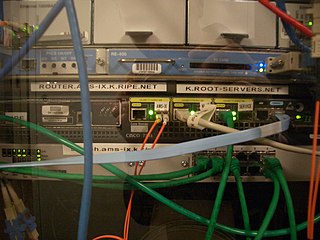
Internet Protocol version 6 (IPv6) is the most recent version of the Internet Protocol (IP), the communications protocol that provides an identification and location system for computers on networks and routes traffic across the Internet. IPv6 was developed by the Internet Engineering Task Force (IETF) to deal with the long-anticipated problem of IPv4 address exhaustion, and was intended to replace IPv4. In December 1998, IPv6 became a Draft Standard for the IETF, which subsequently ratified it as an Internet Standard on 14 July 2017.

The Internet Assigned Numbers Authority (IANA) is a standards organization that oversees global IP address allocation, autonomous system number allocation, root zone management in the Domain Name System (DNS), media types, and other Internet Protocol–related symbols and Internet numbers.

A root name server is a name server for the root zone of the Domain Name System (DNS) of the Internet. It directly answers requests for records in the root zone and answers other requests by returning a list of the authoritative name servers for the appropriate top-level domain (TLD). The root name servers are a critical part of the Internet infrastructure because they are the first step in resolving human-readable host names into IP addresses that are used in communication between Internet hosts.
This page provides an index of articles thought to be Internet or Web related topics.

Fuchū is a city located in western Tokyo Metropolis, Japan. Fuchū serves as a regional commercial center and a commuter town for workers in central Tokyo. The city hosts large scale manufacturing facilities for Toshiba, NEC and Suntory, as well as the Bank of Japan's main computer operations center. Local sporting attractions include the Tokyo Racecourse and the training grounds of Top League rugby teams Toshiba Brave Lupus and Suntory Sungoliath.
The Domain Name System Security Extensions (DNSSEC) are a suite of extension specifications by the Internet Engineering Task Force (IETF) for securing data exchanged in the Domain Name System (DNS) in Internet Protocol (IP) networks. The protocol provides cryptographic authentication of data, authenticated denial of existence, and data integrity, but not availability or confidentiality.

Keio University, abbreviated as Keio (慶應) or Keidai (慶大), is a private research university located in Minato, Tokyo, Japan.

.jp is the Internet country code top-level domain (ccTLD) for Japan. It was established in 1986 and is administered by the Japan Registry Services.
RIPE NCC (Réseaux IP Européens Network Coordination Centre) is the regional Internet registry (RIR) for Europe, the Middle East and parts of Central Asia. Its headquarters are in Amsterdam, Netherlands, with a branch office in Dubai, UAE.

Hiroshi Aramata is a Japanese author, polymath, critic, translator and specialist in natural history, iconography and cartography. His most popular novel was Teito Monogatari, which has sold over 5 million copies in Japan alone.

Mixi is an online Japanese social networking service. It was founded in 1999 and is owned by Mixi, Inc.. As of September 2012, Mixi had about 14 million monthly active users, with about 8.6 million of those on smartphones. Mixi, Inc. was founded by Kenji Kasahara in 1999 as a limited liability company and became a Japanese corporation in 2000. The company changed its name to Mixi, Inc. from E-Mercury, Inc. in February 2006 to align its name with the social networking service, and was updated to MIXI, Inc. in 2022. Its headquarters are in Shibuya, Tokyo.
Japan University NETwork (JUNET) was a computer network established by three universities, Tokyo University, Tokyo Institute of Technology and Keio University in October 1984 for test and research purposes. At its height it connected 700 machines. Comparable to the model of the American Usenet, it employed a UUCP implementation over telephone line. JUNET played an important role in the development of the Internet in Japan. It was made obsolete with the development and growing popularity of the WIDE Project, and was discontinued in October 1994.
The MAWI Working Group is a joint effort of Japanese network research and academic institutions to study the performance of networks and networking protocols in Japanese wide area networks.

Tsukuba is a city located in Ibaraki Prefecture, Japan. As of July 1, 2020, the city had an estimated population of 244,528 in 108,669 households and a population density of 862 persons per km². The percentage of the population aged over 65 was 20.3%. The total area of the city is 283.72 square kilometres (109.54 sq mi). It is known as the location of the Tsukuba Science City, a planned science park developed in the 1960s.

Senshu University, most of the time referred to as SENSAI (専修) or Sen-Dai (専大), is a private university located in Chiyoda City, the heart of Tokyo, Japan. Founded in 1880 as Senshu College, which was recognised as one of the Five Great Law Schools by four co-founders, it is one of the oldest universities in Japan. The university has a total of about 20,000 students from all over the Greater Tokyo Area: Kanda and Ikuta. Senshu is organised into 7 undergraduates, 5 graduates, 1 professional graduate school; and 12 research institutes. The university currently has partnerships with 35 universities and institutions in 19 countries. Some of the University's partners include: the University of Bristol (England), the University of Barcelona (Spain), Peking University (China), and the University of Oregon.
Various schools and universities serve Tokyo, Japan.
IEEE Internet Award is a Technical Field Award established by the IEEE in June 1999. The award is sponsored by Nokia Corporation. It may be presented annually to an individual or up to three recipients, for exceptional contributions to the advancement of Internet technology for network architecture, mobility and/or end-use applications. Awardees receive a bronze medal, certificate, and honorarium.

Jun Murai is a Japanese professor and administrator known as "the father of Internet in Japan" and "Internet Samurai". He is a professor at Keio University. Murai is the founder of JUNET and founder of the WIDE Project. Murai graduated from Keio University in 1979 and received a Ph.D. from the same school in 1984. On October 1, 2009, Murai became the Dean of the Faculty of Environment and Information Studies.

Keio University Shonan Fujisawa Campus, also known as “Keio SFC” is a research-oriented campus of Keio University located in the city of Fujisawa, Kanagawa Prefecture, Japan. The campus currently offers three undergraduate courses and two postgraduate courses, and incorporates one high school and several research institutes. The campus was designed by Fumihiko Maki, a Pritzker Prize laureate.

The Japan 2022 FIFA World Cup bid was the second official bid from the Japan Football Association or the JFA. Had this bid been successful, Japan would have been hosting their second World Cup Finals and it would have been their first solo hosting since they shared the 2002 FIFA World Cup with other co-host South Korea, becoming the sixth nation to host the tournament twice, after Italy, France, Mexico, Brazil and (West) Germany. On May 4, 2010, the Japanese Football Association Bid team decided to concentrate solely on winning the right to host the 2022 FIFA World Cup.












